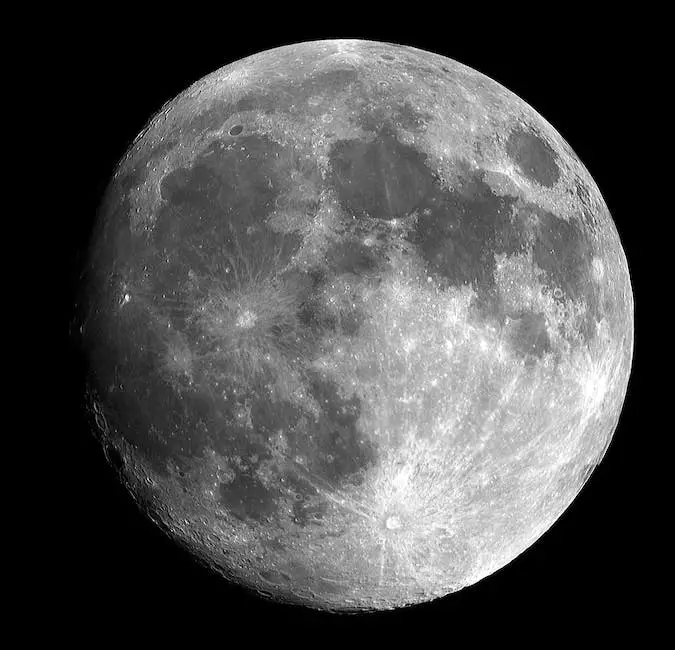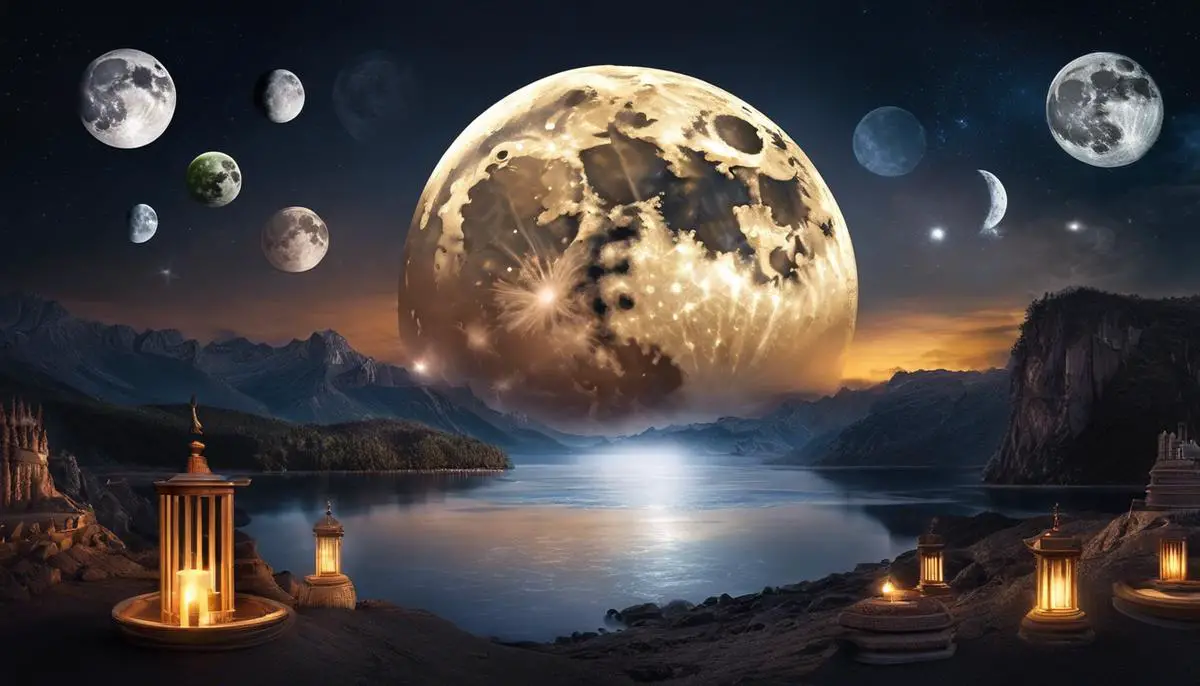The engaged curiosity of mankind has often gazed upwards, pondering the mysterious and profound impact celestial bodies, particularly the moon, might have on our behavior. Rooted in cultural folklore, philosophical inquiries, and scientific curiosities, the correlation between the moon’s cycles and human mood, physiology, and psychology has been a subject of scrutiny across generations and cultures. This essay explores the scientific substance of this intriguing hypothesis – does the full moon genuinely shape our moods or is it all in our heads? Focusing in-depth on the forthcoming full moon of January 2024, we will explore its potential effects on our emotional, psychological, and physiological state through the lens of astrobiology, psychology, human biology, and neuroscience.
The Concept and Prevalence of Lunar Effects
Lunar Influences on Human Behavior: Myths, Science, and Beliefs
Surrounding our beautiful moon are numerous beliefs and folklore that have carved deep impressions in the realm of human culture. Among these are assertions that lunar cycles have the power to influence human behavior, a notion vividly present in various societies worldwide. But how prevalent is this belief, and more importantly, what does science have to say about it?
In a global sphere brimming with diverse cultures and scientific dogmas, it’s not surprising that a lot of people embrace the idea of lunar influences on human behavior. A study published in the International Journal for Nursing Studies found that around 80% of nurses and 64% of doctors believe that lunar cycles affect mental health patients’ behavior, solidifying these ideologies’ pervasiveness.
The science, however, paints a stark contrast to these beliefs. In looking at lunar effects on humans, it is necessary to discern between correlation and causation, in order to distinguish the lines between science and myth.
Some speculate that the moon influences human behavior due to gravitational effects, similarly to how lunar forces trigger ocean tides. Yet, this theory lacks empirical support. The gravitational effect of the moon on small objects here on earth, including humans, is minuscule compared to other factors such as atmospheric pressure – rendering this argument as likely folklore.
Sleep researchers, on the other hand, have recorded slight changes in sleep patterns during full moon cycles. Nevertheless, these findings are correlation-based, and whilst promising, they remain scientifically inconclusive regarding causation. Furthermore, it’s essential to underscore the power of cognitive bias – where individuals are more likely to remember events that align with their existing beliefs.
Various scientific studies have accordingly scrutinized the lunar effect hypothesis. Their results are overwhelmingly consistent: there is no substantial evidence linking lunar phases to spikes in aberrant human behavior, including mental health issues, crime rates, or hospital admissions.
In debunking the myth of lunar effects on human behavior, it becomes clear that our fascination with the moon is as much a testament to the human imagination as it is to our yearning for understanding the universe. The absence of scientific validation should not dampen the intrigue, but rather, inspire further investigation and critical observation for those passionately devoted to the enigma of our celestial partner. The notion that science has definitively ruled out lunar influences is a persistent, and arguably beautiful testament to human curiosity. As is often the case in scientific research, the absence of evidence is not always evidence of absence.

Scientific Investigation into Lunar Influence on Human Physiology and Psychology
Delving Deeper into The Lunar Influence: Casting A Scientific Eye on Human Physiology and Psychology
The moon, in its stately journey across the night sky, has been the fixation of humankind for millennia. Gravitational pull exerted by the moon, known to shape the oceanic tides, is often misconstrued as influencing our physiology and behavior. Scientifically, this attribution can feel like a tempting explanation for our actions, never letting us out of its lunar embrace. Yet, the true substance of such claims warrants careful examination based on solid empirical evidence.
While human bodies do contain large amounts of water, the gravitational effects of the moon on individual human beings are negligible in comparison to other factors. It’s intriguing to consider the possibility that our physiological processes could mirror the rhythmic ebbing and flowing of the ocean’s tide. But alas, the size of water bodies and their unconfined nature make this correlation invalid for the human body.
On the other hand, many people claim anecdotally to experience difficulty in sleeping or changes in energy levels during different phases of the lunar cycle, mainly the full moon. These, too, have been subject to extensive scientific inquiry. Longitudinal studies and rigorous sleep experiments have implied some truth to these claims, revealing subtle alterations in sleep duration, depth, and quality synchronized with moon cycles. But it’s vital to remember, the observed change is a mere matter of a few minutes or less in sleep latency and overall sleep duration.
Bolstering the objectivity in this area, a construct termed as ‘illusory correlation’ has been used to explain the persistence of belief in the lunar effect. This cognitive bias purports that we are predisposed to perceive a relationship between two unrelated events. Thus, our minds, apt in crafting narratives in an attempt to comprehend our world better, might lend the moon, a celestial observer of our lives, more credit than it is due.
Most importantly, it is in the realm of psychology, particularly in the assessment of aberrant behavior, where lunar lore truly thrives. However, studies using robust research methodologies have yet to establish a direct causational link between the two. Furthermore, the increase in abnormal behavior during full moons may be more accurately ascribed to ‘confirmation bias,’ another instance of our cognitive missteps.
These findings invite curiosity not so much about the moon’s influence on us but rather about our adamant inclination to believe in it. It posits an alluring opportunity to explore human cognitive biases, reasons behind our ancestral beliefs, and the collective societal patterns that shape our worldviews.
As our understanding of the human mind continues to evolve, so should our approach to assessing the moon’s influence. The paradigms we turn to, particularly in light of behavioral sciences and critical thinking, play an integral role in establishing causality. To this end, more sophisticated and objective validation measures may offer key insights towards a thorough understanding of this enigmatic relationship.
In conclusion, scientific evidence lacks substantial proof of any significant lunar influence on human physiology and psychology. Much of the belief can be attributed toward cognitive biases that have been perpetuated down the years, demonstrating once again the fascinating intricacies of the human mind. While the moon’s ethereal allure may forever captivate our collective consciousness, scientifically, it gleams as a symbol of our inquisitive spirit rather than an influential actor in our daily lives.

Specific effects of the Full Moon in January 2024
In spite of considerable investigation into the potential impacts of lunar cycles on human behavior, the alleged effects of the full moon in January 2024 remain primarily speculative. The documented physiological, psychological, and emotional reactions in people during this time derived mostly from self-reported experiences and can yield different conclusions subject to interpretation.
Researches have thoughtfully explored whether there might be an uptick in hormone-producing gland activities, specifically the pineal gland, which regulates the sleep-wake cycle, during a full moon. However, studies have yet to conclusively link lunar activity to significant variations in melatonin or cortisol levels, the hormones responsible for modulating our sleep patterns and stress response.
When it comes to psychological fluctuations during full moon cycles, considerations have delved into hypothetical effects on mental health conditions. More research has taken into account the potential for increases in anxiety and mood disorders synchronous with the lunar cycle. But such links remain conjectural, thrust into the spotlight often due to cultural fascination rather than empirical evidence.
Bringing emotional effects into focus, numerous analyses conducted across diverse populations have attempted to ascertain an element of lunar influence. Yet, the prevalence of emotional disturbances reported during full moon phases is comprehensively assessed as no more significant than during any other lunar phase. This absence of any marked upsurge in emotional volatility during the full moon is a recurring theme in scientific literature, further discrediting the linked lunar lore.
Ultimately, the connection between the full moon and variations in human physiology or behavior is still part of ongoing discourse. Claims tethering the moon’s gravitational pull to alterations in human bodily fluids and subsequent behavior changes are yet to bear solid scientific endorsement.
The scientific community remains cautious in attributing human behavior and physiological changes to lunar activity. Such claims entail methodological challenges, including the influence of selection bias in self-reported data and the potential for expectancy effects. Stringent research would necessitate monitoring large samples over lengthy periods and across lunar cycles while controlling for other potential influencing elements. This complex exploration underscores the inherent need for rigorous, controlled inquiry to sift facts from folklore in this intriguing sphere of knowledge.
While the science behind robust links between human living systems and the lunar cycle is not yet concrete, it doesn’t diminish the moon’s presence in human conceptual thought and folklore. These enduring beliefs can perhaps be seen as a testament to the rich tapestry of human curiosity and our lasting bond with the world beyond our planet. But for now, the moon, with all its allure and mystery, remains an object of study and fascination rather than scientifically proven influence.

Future Scope and Applications of Lunar Influence Research
Future research in the realm of lunar influences on mood and behavior, against this backdrop of contrasting beliefs and scientific research, holds vast potential for enlightening our understanding of our celestial relationship with the moon.
One promising avenue for such research may revolve around a deeper investigation into neuro-endocrine pathways that could potentially be influenced by the lunar cycle. For example, the fine interplay between the brain and endocrine system, which regulates mood and behavior, may hold clues to subtle lunar impacts barely noticeable in daily life. Studies examining changes in levels of serotonin, a critical neuro-transmitter implicated in mood regulation, or endocrinological changes throughout the lunar cycle could contribute noteworthy findings to this field of study.
However, this pursuit of knowledge is not without its challenges. Large scale studies capable of capturing these potentially slight influences may be necessary to accumulate a robust body of evidence. Furthermore, discerning the effects of real physiological changes and placebo responses could present a particular challenge, given the ingrained cultural beliefs associated with the moon’s influence. This represents yet another instance underscoring the importance of employing a strict scientific methodology, blinding, and controls in such research.
The use of technology in future research could prove invaluable. Actigraphy, sleep laboratories and biological ‘wearable’ technologies may revolutionize our ability to capture precise data pertaining to sleep patterns and mood alterations synchronized to lunar phases. Remote sensing technologies and big data analytics might further extend our capacity to identify and correlate lunar influences on a global scale.
Moreover, multi-disciplinary approaches that connect astronomy, anthropology, psychology, and physiology would also enrich our understanding. With the moon believed to be a significant icon for early humankind, cultural and historical perspectives could shed light on why lunar beliefs persist. Does the moon indeed exert hidden influences shrouded in the enigma of folklore, or our fascination is merely a cultural inheritance traced back to ancient civilizations? Questioning the moon’s role in shaping societal patterns could provide intriguing perspectives.
Certainly, the implications of this exploration are significant. A clear understanding of the moon’s impact, or lack thereof, on our behaviors and physiology would minimize unfounded beliefs and anxieties about lunar influences on human well-being. Moreover, if established, such connections could have fascinating applications ranging from clinical psychology to societal planning- imagine predicting and preparing for changes in public mood or behavior!
Overall, the conduct of future studies demands a meticulous approach and a readiness to accept null results, should the moon prove a passive spectator in our lives. Yet the quest is profound, one that forces humankind to confront its age-old fascination with a celestial body, teetering on the line separating science and mysticism. As we continue to probe the mysteries of the cosmos, the moon, our closest celestial neighbor, remains a tantalizing subject, gleaming in the night, subtly challenging us to fathom its influences.

As we continue advancing into an era where scientific research broadens its boundaries towards cosmic phenomena, future implications of lunar influence on human behavior hold intriguing potential. The exploration of such effects can undoubtedly revolutionize our understanding of human-cosmic interactions and peel back more layers of our intertwined biopsychosocial health. From aiding the development of comprehensive mental health strategies to enhancing sleep science studies, the insight into lunar influence can offer a panoramic view of humanity’s relationship with the cosmos. What started as a celestial curiosity dances on the realm of potential scientific reality, probing deeper into the enigmatic dance between the moon and the intricate facets of human behavior.
![]()
